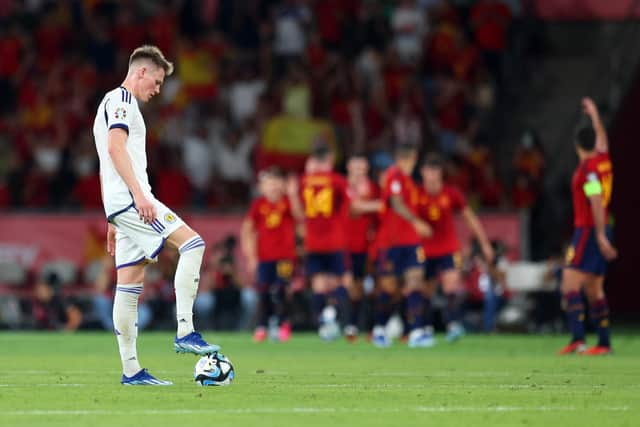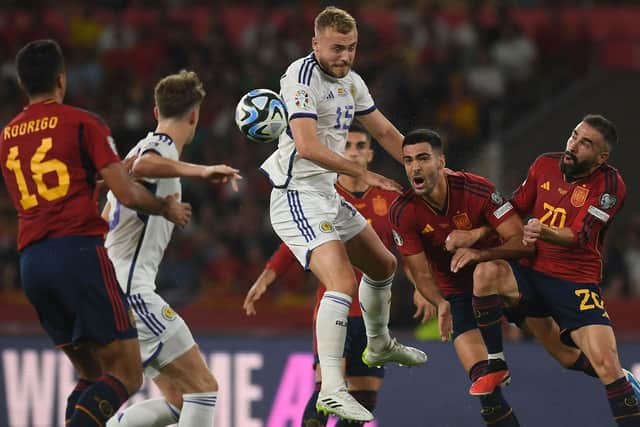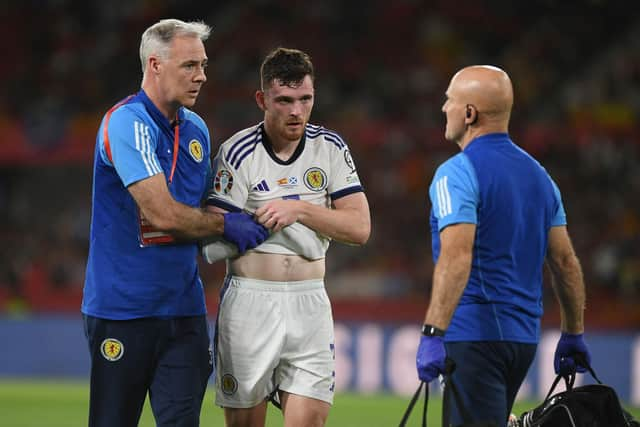Scotland forced to wait for Euro 2024 place as VAR puzzler denies Scott McTominay his James McFadden moment
Scotland remain on course for Euro 2024. This is the main detail they must try and concentrate on amid the roundly-held impression that they were the victims of a grievous miscarriage of justice in the form of a chalked off Scott McTominay free-kick goal on the hour mark.
Even the reason seemed mired in confusion. Was it for offside, or was it for mild interference by Jack Hendry on ‘keeper Unai Simon, who was himself involved in a crashing challenge on Andy Robertson that led to the Scotland skipper’s enforced removal before half time.
Advertisement
Hide AdAdvertisement
Hide AdNever mind the whys and wherefores, it was hard to avoid the conclusion it was the defining moment, with Spain responding to the let-off by scoring twice in the last 17 minutes through skipper Alvaro Morata and substitute Oihan Sancet to move to within a draw against Norway on Sunday of next summer’s finals.


That would suit Scotland too although there might be some sourness at qualifying on the back of opponents who were the recipients of such seeming charity from the officials here.
Of course, some might regard it as justice in a way for Scotland on the 46th anniversary of Joe Jordan shooting his arm up into the sky and winning a critical penalty against Wales in a game that saw Ally MacLeod’s side quality for the 1978 World Cup.
Fortunately, there was no VAR then. Technology did for the Scots here.
Spain were growing frustrated. They had resorted to niggly fouls. One of them, after Dani Carvajal tugged Ryan Christie, resulted in a Scotland foul near the Spanish byline. No-one should have been surprised when McTominay – scorer of six goals in his last six international appearances, and two on his last outing for Manchester United – curled his effort straight into the top corner, but it still felt like a stop-all-the-clocks, James McFadden-against-France kind of moment.


And then VAR intervened to rob McTominay of the sweetest moment. Davie Narey remains the last Scotland player to score in this beautiful but blasted city.
Lyndon Dykes jabbed a finger into his temples and urged his teammates to keep their focus. It was still 0-0. Scotland were inching ever nearer a famous result although another blow had been dealt in Larnaca, where Norway had added a second goal against Cyprus.
And then another, more significant setback arrived on the pitch where Scotland were seeking to qualify for Euro 2024 on account of their own efforts. This became a far harder task after Morata flashed a neat header beyond Gunn after 73 minutes. More late Spanish pressure saw a combination of Sancet and Scotland defender Ryan Porteous, while making a despairing challenge, send the ball across the line for Spain to match the size of Scotland win against them at Hampden in March.
Advertisement
Hide AdAdvertisement
Hide AdNo one can pretend Scotland had not been living dangerously. It was a long first half from the opening minute, when Ferran Torres dinked a shot just past the post when one-on-one with Gunn. Some luck contributed to the success of the first part of Clarke’s plan – get to half time without conceding – as did some good old fashioned defending.


That was typified by the excellent Aaron Hickey hurling himself in the way of a shot from Mikel Oyarzabal. Gavi’s drive then hit the inside of Gunn’s right-hand post and ran behind the goalkeeper and across the line.
The Mexican waves started around midway through the opening half which was a sign that, while Scotland were not finding it easy, they were proving stuffy enough to leave the locals in dire need of some other form of alternative entertainment. So far, so good as far as Clarke and his team were concerned.
Admirably, the Tartan Army refused to involve themselves in the waves circling around the stadium, with their stubborn resistance met with piercing whistles. Scotland were not playing ball. Not on the pitch, where they were refusing to bow under intense Spanish pressure, and not in the stands.
Spain were not always playing ball either. Certainly not the ball. Never mind tiki-taka, John McGinn was the victim of something resembling the violence of hari-kari when he was left flattened by a blatant bodycheck by Carvajal. Dutch referee Serdar Gozububuyuk mystifyingly waved play on.
But that was nothing compared to the challenge that robbed Scotland of their skipper. Robertson was taken out of the game literally by Unai Simon shortly before half time. The sad sight of the Liverpool player making his way round the pitch was compounded by the realisation that Hickey, Scotland’s best player up to that point, would be switching position, from right wing-back to left, with Clarke having opted for a back-five despite Kieran Tierney's absence.
What a badge of honour for the 21-year-old. What a statement of faith for Clarke to feel confident enough in Hickey to have swap flanks, against a team as full of stars as Spain. What a commendation of the merits of being two footed.
There were enough Tartan Army footsoldiers to ensure that Rodri - who accused the Scots of playing "rubbish" football in March - must have been very conscious of having his every touch jeered despite playing in his own country at a stadium specifically chosen by the Royal Spanish Football Federation because of its partisan properties.
Advertisement
Hide AdAdvertisement
Hide AdIt certainly felt cavernous and perhaps slightly intimidating but it was not full and the distance between the pitch and stands meant that poor old John Carver did not have to worry about his steps quota as he ferried messages and advice to Clarke, who stood on the edge of the vast technical area.
There was certainly no chance of Gunn being hit by half a loaf of bread, something that happened to Jim Leighton. He was the last Scotland goalkeeper to line up against Spain in Seville and was forced to perform amid a barrage of projectiles, sweet Spanish oranges mostly. Scotland were bit by a far more bitter blow here.
Comments
Want to join the conversation? Please or to comment on this article.